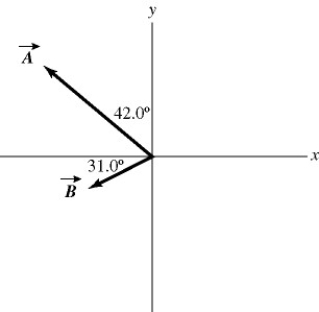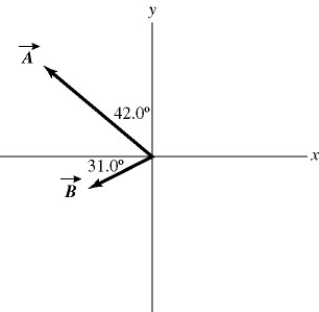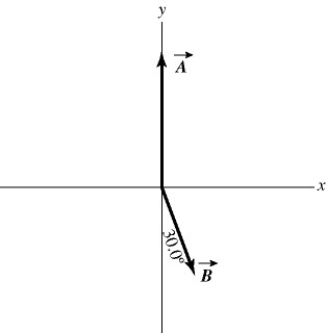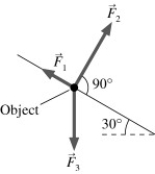Exam 3: Vectors and Coordinate Systems
Exam 1: Concepts of Motion52 Questions
Exam 2: Kinematics in One Dimension59 Questions
Exam 3: Vectors and Coordinate Systems33 Questions
Exam 4: Kinematics in Two Dimensions50 Questions
Exam 5: Force and Motion31 Questions
Exam 6: Dynamics I: Motion Along a Line46 Questions
Exam 7: Newtons Third Law43 Questions
Exam 8: Dynamics Ii: Motion in a Plane20 Questions
Exam 9: Impulse and Momentum20 Questions
Exam 10: Energy43 Questions
Exam 11: Work100 Questions
Exam 12: Rotation of a Rigid Body113 Questions
Exam 13: Newtons Theory of Gravity50 Questions
Exam 14: Oscillations49 Questions
Exam 15: Fluids and Elasticity72 Questions
Exam 16: A Macroscopic Description of Matter29 Questions
Exam 17: Work, Heat, and the First Law of Thermodynamics98 Questions
Exam 18: The Micromacro Connection39 Questions
Exam 19: Heat Engines and Refrigerators50 Questions
Exam 20: Traveling Waves49 Questions
Exam 21: Superpositions64 Questions
Exam 22: Wave Optics51 Questions
Exam 23: Ray Optics63 Questions
Exam 24: Optical Instruments49 Questions
Exam 25: Electric Charges and Forces26 Questions
Exam 26: The Electric Field32 Questions
Exam 27: Gausss Law41 Questions
Exam 28: The Electric Potential40 Questions
Exam 29: Potential and Field57 Questions
Exam 30: Current and Resistance32 Questions
Exam 31: Fundamentals of Circuits68 Questions
Exam 32: The Magnetic Field87 Questions
Exam 33: Electromagnetic Induction66 Questions
Exam 34: Electromagnetic Fields and Waves52 Questions
Exam 35: Ac Circuits46 Questions
Exam 36: Relativity49 Questions
Exam 37: The Foundations of Modern Physics8 Questions
Exam 38: Quantization54 Questions
Exam 39: Wave Functions and Uncertainty18 Questions
Exam 40: One-Dimensional Quantum Mechanics32 Questions
Exam 41: Atomic Physics39 Questions
Exam 42: Nuclear Physics65 Questions
Select questions type
The magnitude of a vector can never be less than the magnitude of one of its components.
Free
(True/False)
4.9/5  (34)
(34)
Correct Answer:
True
Vector  = -1.00
= -1.00  + -2.00
+ -2.00  And vector
And vector  = 3.00
= 3.00  + 4.00
+ 4.00  . What are the magnitude and direction of vector
. What are the magnitude and direction of vector  = 3.00
= 3.00  + 2.00
+ 2.00  ?
?
Free
(Multiple Choice)
4.9/5  (33)
(33)
Correct Answer:
C
Vectors  and
and  Are shown in the figure. Vector
Are shown in the figure. Vector  Is given by
Is given by  =
=  -
-  . The magnitude of vector
. The magnitude of vector  Is 16.0 units, and the magnitude of vector
Is 16.0 units, and the magnitude of vector  Is 7.00 units. What is the angle of vector
Is 7.00 units. What is the angle of vector  , measured counterclockwise from the +x-axis?
, measured counterclockwise from the +x-axis? 
Free
(Multiple Choice)
4.8/5  (25)
(25)
Correct Answer:
D
The components of vector  are
are  = -3.5 and
= -3.5 and  = -9.7, and the components of vector
= -9.7, and the components of vector  Are
Are  = -6 and
= -6 and  = +8.1. What is the angle (less than 180 degrees) between vectors
= +8.1. What is the angle (less than 180 degrees) between vectors  And
And  ?
?
(Multiple Choice)
4.9/5  (34)
(34)
If the magnitude of vector  is less than the magnitude of vector
is less than the magnitude of vector  , then the x component of
, then the x component of  is less than the x component of
is less than the x component of  .
.
(True/False)
4.8/5  (38)
(38)
Vectors  and
and  Are shown in the figure. Vector
Are shown in the figure. Vector  Is given by
Is given by  =
=  -
-  . The magnitude of vector
. The magnitude of vector  Is 16.0 units, and the magnitude of vector
Is 16.0 units, and the magnitude of vector  Is 7.00 units. What is the magnitude of vector
Is 7.00 units. What is the magnitude of vector  ?
? 
(Multiple Choice)
4.7/5  (34)
(34)
Vector  has a magnitude 5.00 and points in a direction 40.0° clockwise from the negative y axis. What are the x and y components of vector
has a magnitude 5.00 and points in a direction 40.0° clockwise from the negative y axis. What are the x and y components of vector  .
.
(Multiple Choice)
4.7/5  (39)
(39)
Vector  has a magnitude of 5.5 cm and points along the x-axis. Vector
has a magnitude of 5.5 cm and points along the x-axis. Vector  has a magnitude of 7.5 cm and points at +30° above the negative x-axis.
(a) Determine the x and y components of Vector
has a magnitude of 7.5 cm and points at +30° above the negative x-axis.
(a) Determine the x and y components of Vector  .
(b) Determine the x and y components of Vector
.
(b) Determine the x and y components of Vector  (c) Determine x and y components of the sum of these two vectors.
(d) Determine the magnitude and direction of the sum of these two vectors.
(c) Determine x and y components of the sum of these two vectors.
(d) Determine the magnitude and direction of the sum of these two vectors.
(Essay)
4.9/5  (34)
(34)
You walk 53 m to the north, then turn 60° to your right and walk another 45 m. Determine the direction of your displacement vector. Express your answer as an angle relative to east.
(Multiple Choice)
4.9/5  (33)
(33)
The components of vector  are
are  = + 3.90 and
= + 3.90 and  = -4.00. What is the angle measured counterclockwise from the +x-axis to vector
= -4.00. What is the angle measured counterclockwise from the +x-axis to vector  ?
?
(Multiple Choice)
4.8/5  (26)
(26)
What is the magnitude of  +
+  +
+  , where
, where  = 1.00
= 1.00  + 4.00
+ 4.00  - 1.00
- 1.00  ,
,  = 3.00
= 3.00  - 1.00
- 1.00  - 4.00
- 4.00  And
And  = -1.00
= -1.00  + 1.00
+ 1.00  ?
?
(Multiple Choice)
4.7/5  (41)
(41)
In the figure, the magnitude of vector  is 18.0 units, and the magnitude of vector
is 18.0 units, and the magnitude of vector  is 12.0 units. What vector
is 12.0 units. What vector  must be added to the vectors
must be added to the vectors  and
and  so that the resultant of these three vectors points in the -x direction and has a magnitude of 7.50 units? Use vector components to find your answer, and express vector
so that the resultant of these three vectors points in the -x direction and has a magnitude of 7.50 units? Use vector components to find your answer, and express vector  by giving its magnitude and the angle it makes with the +x-axis taking counterclockwise to be positive.
by giving its magnitude and the angle it makes with the +x-axis taking counterclockwise to be positive. 
(Short Answer)
4.8/5  (30)
(30)
Vector  = -3.00
= -3.00  + 3.00
+ 3.00  And vector
And vector  = 3.00
= 3.00  + 4.00
+ 4.00  . What is vector
. What is vector  =
=  +
+  ?
?
(Multiple Choice)
4.8/5  (34)
(34)
The components of vector  are
are  = +2.2 and
= +2.2 and  = -6.9 , and the components of vector
= -6.9 , and the components of vector  Are given are
Are given are  = -6.1 and
= -6.1 and  = -2.2. What is the magnitude of the vector
= -2.2. What is the magnitude of the vector  -
-  ?
?
(Multiple Choice)
4.8/5  (35)
(35)
Vector  = 1.00
= 1.00  + -2.00
+ -2.00  And vector
And vector  = 3.00
= 3.00  + 4.00
+ 4.00  . What are the magnitude and direction of vector
. What are the magnitude and direction of vector  =
=  +
+  ?
?
(Multiple Choice)
4.7/5  (28)
(28)
Three forces are exerted on an object placed on a tilted floor. Forces are vectors. The three forces are directed as shown in the figure. If the forces have magnitudes  = 1.0 N,
= 1.0 N,  = 8.0 N and
= 8.0 N and  = 7.0 N, where N is the standard unit of force, what is the component of the net force
= 7.0 N, where N is the standard unit of force, what is the component of the net force  net =
net =  1 +
1 +  2 +
2 +  3 parallel to the floor?
3 parallel to the floor? 
(Multiple Choice)
4.8/5  (33)
(33)
If  -
-  = 0, then the vectors
= 0, then the vectors  and
and  have equal magnitudes and are directed in the opposite directions from each other.
have equal magnitudes and are directed in the opposite directions from each other.
(True/False)
4.9/5  (34)
(34)
A rabbit trying to escape a fox runs north for 8.0 m, darts northwest for 1.0 m, then drops 1.0 m down a hole into its burrow. What is the magnitude of the net displacement of the rabbit?
(Multiple Choice)
4.9/5  (38)
(38)
Showing 1 - 20 of 33
Filters
- Essay(0)
- Multiple Choice(0)
- Short Answer(0)
- True False(0)
- Matching(0)